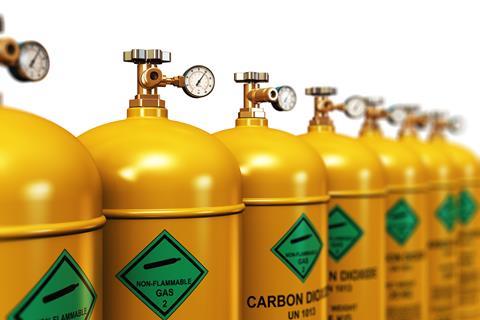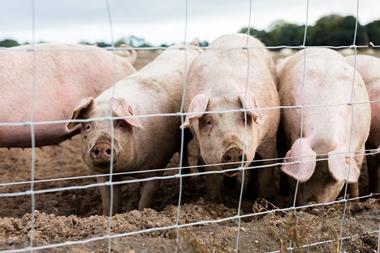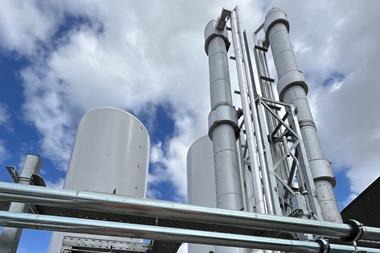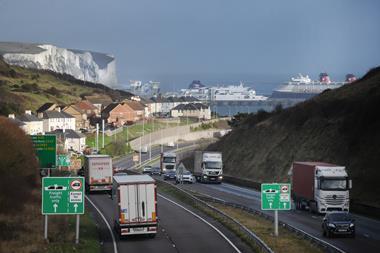
The government failed to recognise the “strategic vulnerability” of CO2 gas supplies before signing the UK/US trade deal, despite the NFU flagging the issue as far back as February, according to its president Tom Bradshaw.
Speaking to The Grocer this week he questioned whether government officials were “doing their job from a strategic perspective”, after the eleventh-hour inclusion of tariff-free access to the UK market for up to 1.4 billion litres of US bioethanol in the deal, announced in May.
CO2 gas is sourced as a byproduct from bioethanol production – with the trade deal prompting the UK’s two main bioethanol producers, Ensus and Vivergo, to warn their business models had become “unviable” because of the deal, opening up the prospect they could close their facilities.
Ensus supplies about 30% of the UK’s CO2 gas needs, with the rest coming from anaerobic digestion facilities (10%) and via imports (60%). Vivergo currently does not produce the gas, but had plans to do so.
Talks over a potential government bailout of the sector are ongoing. But with the threat of CO2 gas supply shortages looming for the third time in seven years, Bradshaw said he had seen “no evidence the government has the evidence (or a clear understanding) as to what the impact of this situation could have on supplies”.
’Massively exposed’ to gas shortages
“The food sector is massively exposed to any CO2 gas shortages,” he added, with any site closures also having an impact on animal feed supplies – which are also sourced as a by-product from bioethanol production.
“We asked Defra for a strategic review of the availability of CO2 that meant we would not be completely reliant on imports,” he said. Given previous supply crises, it needed to be “on a risk register, and at least quarterly, somebody needs to be looking at it”.
Read more: CO2 gas supply still in the balance, despite government crisis talks
European fertiliser production – from which CO2 gas could be sourced as an alternative to bioethanol supply chains – was also down, he added, raising questions about the longer-term viability of gas supply from the continent. “Are they reliable partners that are going to prioritize UK supply in a time of crisis?” he asked.
Similarly, Association of Independent Meat Suppliers spokesman Tony Goodger said CO2 gas supply was “a constant concern for our members because of its dual importance in processing livestock and preserving food”.
A separate issue centred around “the speed at which the price per ton for CO2 can rise. It’s almost a hidden cost within the cost of production”, he added. “The current price per tonne is between £3,000 to £3,500, but it rose to £5,000/tonne the last time we had shortages.”
The Department for Business & Trade said, following a review of the companies’ rescue and restructuring plans, that it was “recruiting external consultants to provide a full appraisal and due diligence of the plans”.
Engagement with the companies would “continue at pace to assess potential solutions with external consultants hired to assist with the process”.

Trade stategy
It comes as the government last week unveiled a new trade strategy, with a renewed focus on breaking down trade barriers.
Key takeaways included a £20bn increase to UK Export Finance’s capacity to a total of £80bn, alongside the creation of a Small Export Builder scheme “to give smaller firms better access to export protection insurance”, plus improvements to help overseas buyers finance repeat orders from trusted UK suppliers in a more streamlined way.
The 100-page policy document also reaffirmed the government’s pledge to protect UK food sector standards in future trade deals and to press ahead with the implementation of the EU SPS deal.
New UK trade strategy is a chance for fairer supply chains
“With UK trade struggling to recover to pre-pandemic levels, we welcome the publication of a new strategy setting out the government’s ambition to remove barriers to trade,” said FDF director of growth and sustainability Balwinder Dhoot.
“The continued focus on a renewed SPS agreement with the EU, to reduce the current burdens that businesses face when trading with our closest and most important trade partner is welcome.”
Provision Trade Federation director general Rod Addy also welcomed the publication of the strategy but cautioned “we are keen to see this ratified as swiftly as possible”.
While the strategy document “mentions ’reducing red tape at the border for British businesses, that hasn’t materialised yet and we are concerned the myriad of big-ticket items vexing European leaders at the moment may steal momentum from the agreement”, he added.
“The benefits to food importers and exporters of scrapping Export Health Certificates and border checks on movements of goods between the UK and the EU would be considerable.”



















No comments yet